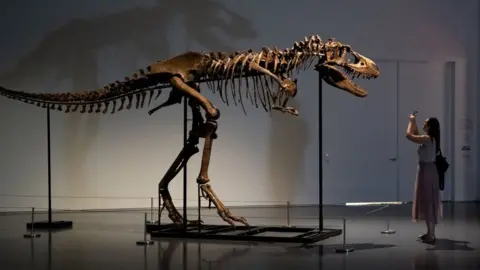Gorgosaurus: Ancient dinosaur skeleton sells for $6m at auction
 Getty Images
Getty ImagesA rare ancient dinosaur skeleton has been sold in the US to an unknown buyer for just over $6m (£5m).
It was offered up by Sotheby's and sold at the firm's natural history auction in New York City on Thursday.
The fossil is that of a Gorgosaurus - a distant relative of the infamous and deadly Tyrannosaurus rex - that was discovered in 2018.
The anonymous buyer will have the unique opportunity to bestow a nickname on the one-time apex predator.
The sale is the second-ever of a fossilised dinosaur skeleton auctioned by Sotheby's. The first, a T-rex nicknamed Sue, was sold to Chicago's Field Museum in 1997 for $8.36m.
The Gorgosaurus was expected to attract bids of up to $8m.
It is the only specimen of its kind to be offered up for private ownership. There are only 20 fossils like it known to exist around the world.
The Gorgosaurus roamed the Earth about 77 million years ago and, like the T-rex, it had a large head, a mouth full of curved serrated teeth, and small two-fingered front limbs.
Though smaller than its cousin dinosaur, it was faster, fiercer and packed a stronger bite, optimised for "cutting into thick skin and penetrating deep into the flesh of their prey", according to Sotheby's.
The fossil was discovered on private land in the US state of Montana. It has 79 bone elements, stands 10ft (3m) tall and is 22ft long.
While a nickname for the Gorgosaurus skeleton has not yet officially been announced, "Gorgeous George" emerged as a strong contender among Sotheby's social media followers.
Other natural history items up for auction on Thursday include a complete T-rex rooted tooth, which sold for just over $100,000, a Triceratops skull, which sold for $661,500, and a sabre-toothed tiger skull.
The world record price for dinosaur fossils remains $31.8m (£24.6m), sold at an online auction to a private buyer in 2020.
Some experts are concerned about dinosaur skeletons being sold on the private market.
"A skeleton like this is part of our collective natural heritage, a vestige of the Earth's past that is relevant to us all," said David Polly, a professor at Indiana University and former president of the Society of Vertebrate Paleontology.
"I feel that all such fossils should go into the public trust where they can be studied, visited and enjoyed by scientists and a wide range of other people."
Gregory M Erickson, a professor of anatomy and vertebrate paleobiology at Florida State University, told the BBC he worries the sale "sends a message that it's just any other commodity that you can buy for money and not for scientific good".
But he said those sales and the fanfare surrounding them are a by-product of our "dinomania" society.
"Right from childhood people are enamoured of dinosaurs, so I can see why people buy dinosaur fossils," he said.
